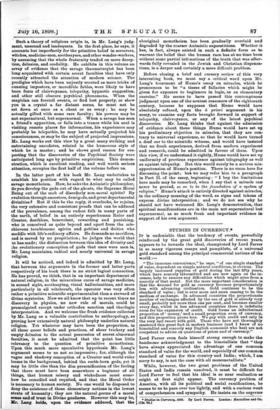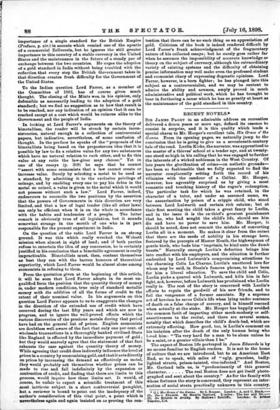STUDIES IN CURRENCY.*
IT is undeniable that the tendency of events, powerfully reinforced by the great gold discoveries of recent years, appears to be towards the ideal, championed by Lord Farrer in so many vigorous essays and pamphlets, of a universal gold standard among the principal commercial nations of the
world :—
" The immense convenience," he says, "of one single standar& of value, dependent on simple natural conditions, is obvious. The largely increased supplies of gold during the last fifty years, which have scarcely intermitted and are now again on the in- crease, help to remove any difficulties which might arise from a scarcity of that metal. But the more important consideration is. that the demand for gold as currency becomes proportionately less with advancing civilisation. Gold continues to be the standard of value ; but is ever more and more ceasing to be the medium of exchange. In advanced countries the proportionate number of exchanges affected by the use of gold is already very small, probably not more than one per cent., and becomes smaller every day, whilst in less advanced countries there is indefinite room for the expansion of credit. Gold forms an infinitesimal proportion of ' money,' and a small proportion even of currency, and this proportion grows less. We pay with credit and only in the very last resort with gold. Those who have not thoroughly mastered this great fact in modern business (and I know of no bimetallist and scarcely any English economist who has) are not. competent to advise on questions of prices and of currency."
Lord Farrer even feels himself strong enough to make the handsome acknowledgment to the bimetallists that " they have always appreciated the advantage of one common standard of value for the world, and especially of one common standard of value for this country and India ; which, I am sorry to say, is not the case with all monometallists."
While, however, the two great problems of the United States and India remain unsolved, it must be difficult for Lord Farrer to feel that his ideal is so near realisation as might at first sight appear. The currency problem of America, with all its political and social ramifications, he seems to us to pass over too lightly, and with a curious want
of comprehension and sympathy. He insists on the supreme
• Studies in Currency, 1898. By Lord Farrar. London; Macmillan and Co. [12s. 6d.]
importance of a single standard for the British Empire (Preface, p. xiv.) in accents which remind one of the apostle of a commercial Zollverein, but he ignores the still greater importance to this country of a stable currency in the United States and the maintenance in the future of a steady par of exchange between the two countries. He urges the adoption of a gold standard in India without being troubled with the reflection that every step the British Government takes in that direction creates fresh difficulty for the Government of the United States.
To the Indian question Lord Farrer, as a member of the Committee of 1893, has of course given much thought. The closing of the Mints was, in his opinion, only defensible as necessarily leading to the adoption of a gold standard ; but we find no suggestion as to how that result is to be reached, nor any indication of an opinion that it can be reached except at a cost which would be ruinous alike to the Government and the people of India.
In looking at Lord Farrer's arguments on the theory of bimetallism, the reader will be struck by certain incon- sistencies, natural enough in a collection of controversial papers, but indicative, nevertheless, of some confusion of thought. In the preface he speaks of the " proposals of the bimetallists being based on the preposterous idea that it is possible by law to fix a relative value for any two substances which have no natural relation to each other, and to fix this value at any ratio the law-giver may choose." Yet in one of the essays (p. 309) he says that he cannot 1' assert with some economists that a law cannot create or increase value. Surely by selecting a metal to be used as a standard, by admitting it to the exclusive privilege of coinage, and by enabling every one to pay his debts in the metal so coined, a value is given to the metal which it would not possess without such a law." Lord Farrer, indeed, endeavours to reconcile the two positions by the assertion that the powers of Governments in this direction are very limited, and that a law of legal tender (like all other laws) can only be efficient when it is on the whole in accordance with the habits and tendencies of a people. The latter remark is obviously true of all legislation, but it sounds somewhat strange in the mouth of one who is in part responsible for the present experiment in India.
On the question of the ratio Lord Farrer is on strong ground. It was this which really wrecked the Wolcott mission when almost in sight of land; and if both parties refuse to entertain the idea of any concession, he is certainly justified in his conclusion that a bimetallic agreement is really impracticable. Bimetallists must, then, content themselves as best they can with the barren honours of theoretical superiority, which Lord Farrer would be almost alone among economists in refusing to them.
From the quotation given at the beginning of this article, it will be seen that Lord Farrer adopts in its most un- qualified form the position that the quantity theory of money is, under modern conditions, true only of standard metallic money with the addition of all the forms of credit to the extent of their nominal value. In his arguments on this question Lord Ferrer appears to us to exaggerate the changes in the direction of the extended use of credit which have occurred during the last fifty years and which are now in progress, and to ignore the well-proved effects which the various discoveries of the precious metals during that period have had on the general list of prices. English economists ere doubtless well aware of the fact that only one per cent. of wholesale transactions in a thoroughly banked civilised State like England is effected by the immediate payment of gold ; but they would scarcely agree that the statement of that fact exhausts the case against the quantity theory of money. While agreeing that credit does indirectly influence the level of prices in a country by economising gold, and that it acts directly on prices by increasing the demand as effectively as metal, they would probably ask themselves whether• prices can be made to rise and fall indefinitely by the expansion or contraction of credit, and finding that there are limits to this process, would inquire how these limits act. It would, of course, be unfair to expect a scientific treatment of this most intricate subject in a short controversial pamphlet, but a reviewer is bound to point out the inadequacy of the author's consideration of this vital point, a point which is nevertheless again and again insisted on as proving the con-
tention that there can be no such thing as an appreciation of gold. Criticism of the book is indeed rendered difficult by Lord Farrer's frank acknowledgment of the fragmentary nature of his collected essays; but he surely goes rather far when he assumes the impossibility of accurate knowledge or theory on the subject of currency, although the extraordinary variety of existing systems and the difficulty of obtaining precise information may well make even the professed student and economist chary of expressing dogmatic opinions. Lord Farrer, however, is a born fighter ; he has plunged into this subject as a controversialist, and we may be content to admire the ability and acumen, amply proved in much administrative and political work, which he has brought to bear in furthering a cause which he has so greatly at heart as the maintenance of the gold standard in this country.



































 Previous page
Previous page